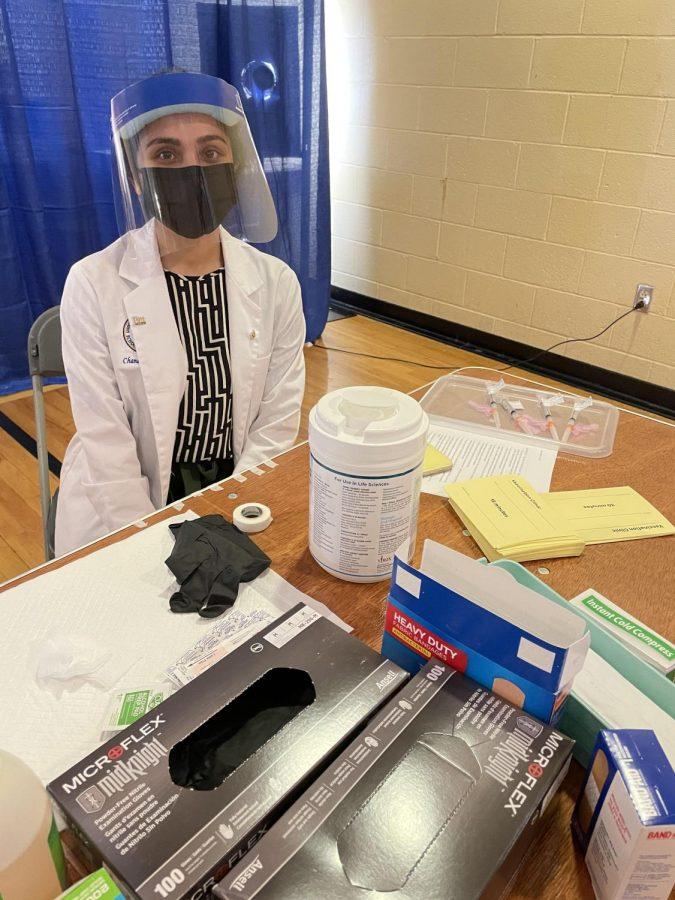Pharmacy students deliver COVID-19 vaccines to Homewood, Hill District residents
Photo courtesy of Chandrima Saha
Chandrima Saha and a few pharmacy school peers administered COVID-19 vaccines to senior citizens on Feb. 5 and Feb. 6.
February 24, 2021
For Black pharmacy students like Nnenna Anyanwu, the chance to help underserved and predominantly Black communities in the Pittsburgh area by administering COVID-19 vaccines was something that hit close to home.
“Having lived in Pittsburgh for a while, I know that the Homewood and Hill District are predominantly underserved and Black population, so I was really happy to go out there and help out because there’s not that many Black people in health care, and I know that a lot of Black people are concerned about the medical field and the COVID vaccine, because they don’t know who to trust,” Anyanwu said. “I was really glad to be a part of the pharmacy school initiative and be a source of representation for the Black community.”
Pitt’s School of Pharmacy took second-year students to the Hill District and Homewood to administer over 1,000 COVID-19 vaccines to senior citizens on Feb. 5 and Feb. 6. The Allegheny County Health Department set up two vaccination sites with 60 pharmacy students each administering the Moderna vaccine to people ages 65 and older. This initiative was part of the School’s goal to help underserved neighborhoods and better exemplify to their students what equitable health care should be, as outlined by the new Pledge of Professionalism oath written this year.
Travis Van Otterloo, a second-year pharmacy student, said he was excited when he heard that he would be able to help vaccination efforts and thought it was a great idea to help out the community.
“My emotions were all over the board. I was definitely excited,” Van Otterloo said. “I thought that it was going to be a fantastic experience for me, but also something great for the community that we were able to aid in, and there’s no doubt in my mind that every single patient that walked out of each of those clinics that day were extremely happy.”
Van Otterloo said he was impressed with the way that the pharmacy school has been handling this new way of education through the pandemic and is grateful for the hands-on learning.
“I think they’re handling it incredibly well,” Van Otterloo said. “I mean of course there’s gonna be some bumps in the road and everything, especially during a pandemic there’s so many things that are out of your hands, but they laid out the complete list of things we needed to do to be certified to vaccinate patients and the planning for this has been impeccable.”
Van Otterloo, who was volunteering on Feb. 5 said the patients who received the vaccines heard about the event through word of mouth.
“When we first got there, we were told that in the Homewood district, this was not a thing that was advertised. When you go to nursing homes and things like that, these things are going to be advertised and certain dates and times will be set up,” Van Otterloo said. “That’s not the same in underprivileged areas where this event was spread by word of mouth from person to person, so it truly was a community-led event, which is significantly different from any other mass vaccination upwards like that.”
Anyanwu said being one of the few Black health professionals that day, she realized how necessary it was to have proper representation and diversity within the healthcare industry when some patients of color asked for her opinion on what medical practices they should trust.
“I had this one, an older Black gentleman came up to me and expressed his grievances with the COVID vaccine because he didn’t know whether or not to get it, so he asked me personally because I was the only Black staff member in the pharmacy at the time,” Anyanwu said. “He said that he would have felt more relief if he saw more Black pharmacy students, more Black pharmacists and more Black people in health care.”
Chandrima Saha — a second-year pharmacy student who vaccinated approximately 30 patients in Homewood on Feb. 5 — said this experience felt like she was making history.
“I think that the whole experience is unreal because first of all, like we have been doing school online so being able to be just as present in something like this feels like we’re making history,” Saha said.
Having participated in this clinic, Anyanwu also said the initiative is the first step to providing better representation and equality within the health care field, and she hopes the University will continue with these efforts.
“I think we should continue helping underserved areas because everyone deserves equal opportunity to health care, especially with the COVID vaccine distributions,” Anyanwu said. “It’s important for people to get equal access to health care, and just making sure that it is available for them.”
Anyanwu said the experience made her feel part of a bigger movement, and like she was making a difference in the lives of patients.
“I felt like I was actually going out and personally making a difference in someone’s life since this was definitely more personal because I could see the patient’s reaction, I could see their gratitude, I could see how grateful they were,” Anyanwu said. “I felt like I was doing something big and if I look back I can say confidently in the future that I definitely helped them.”



